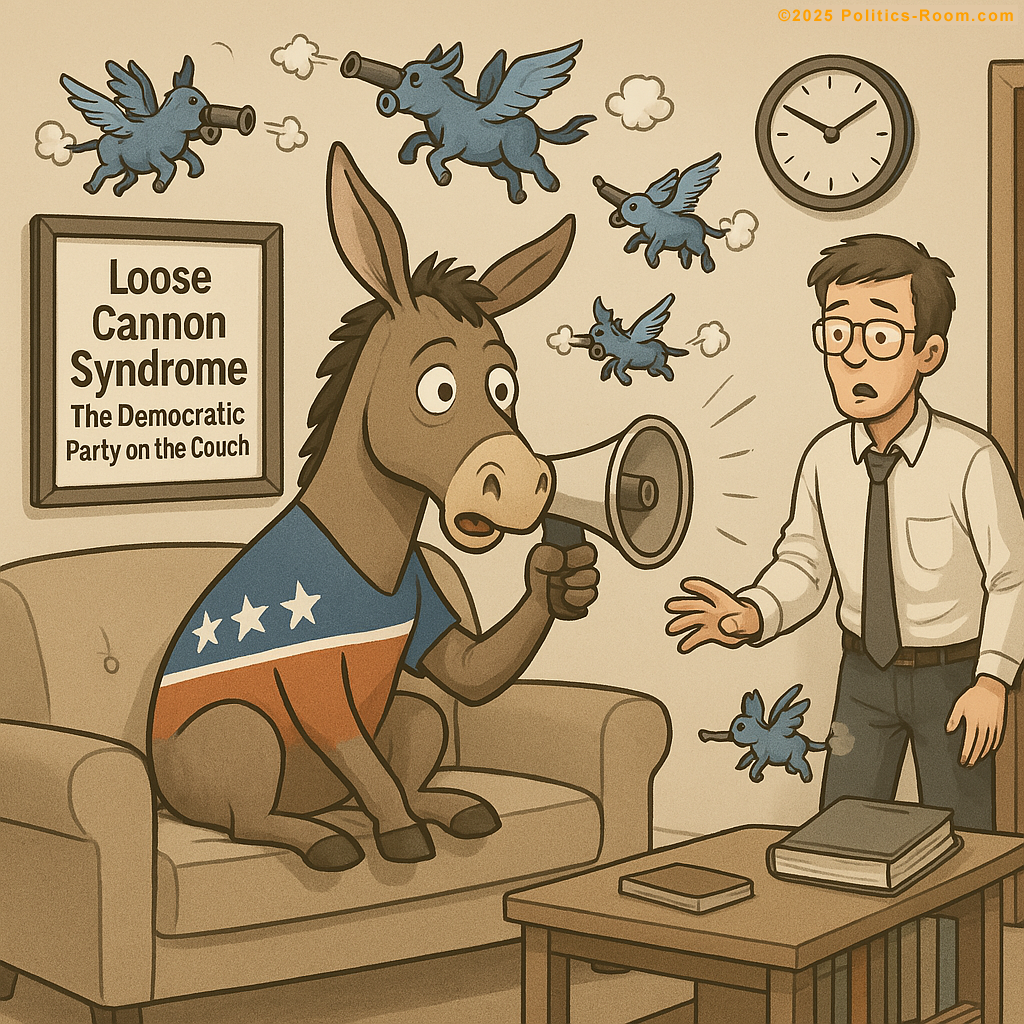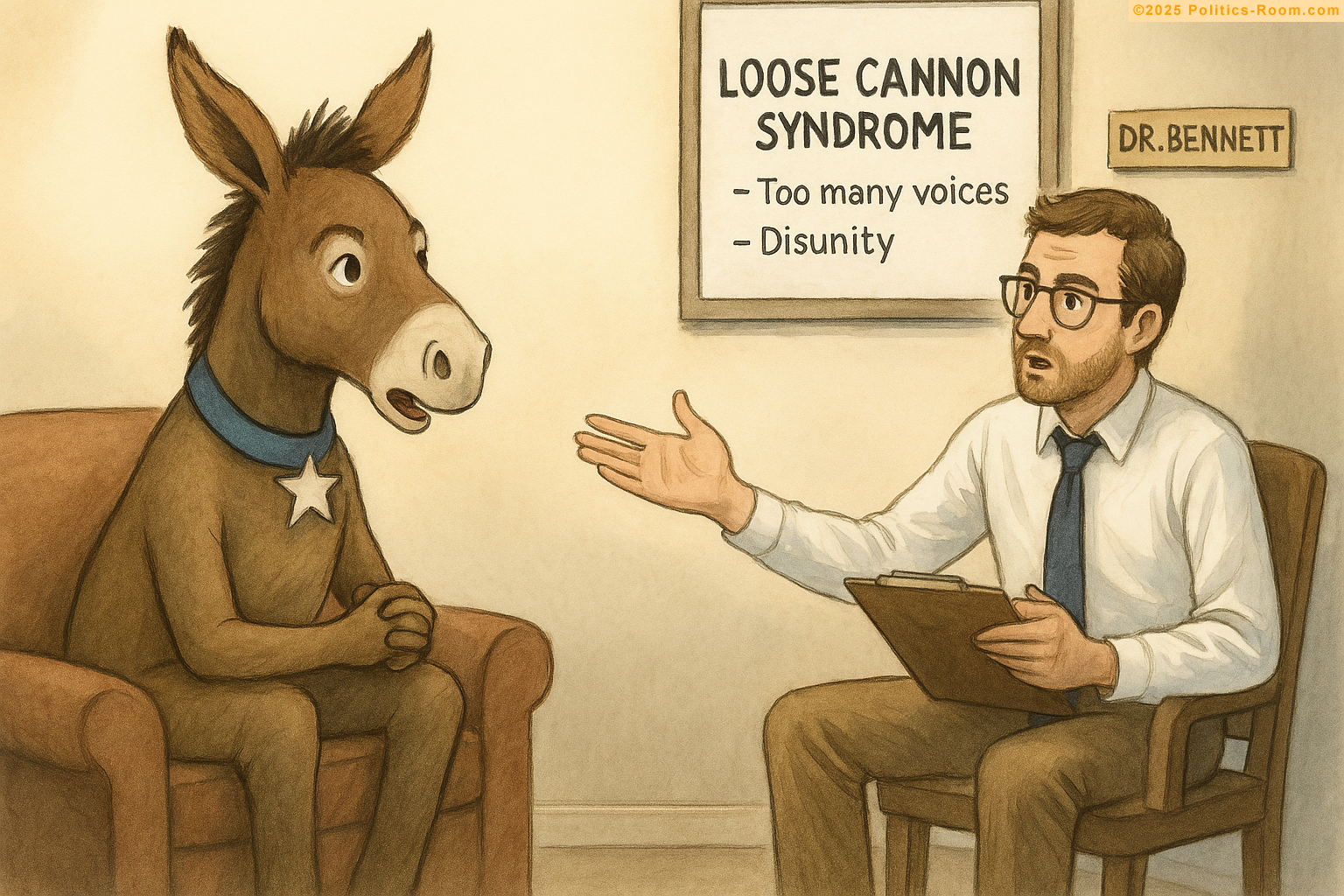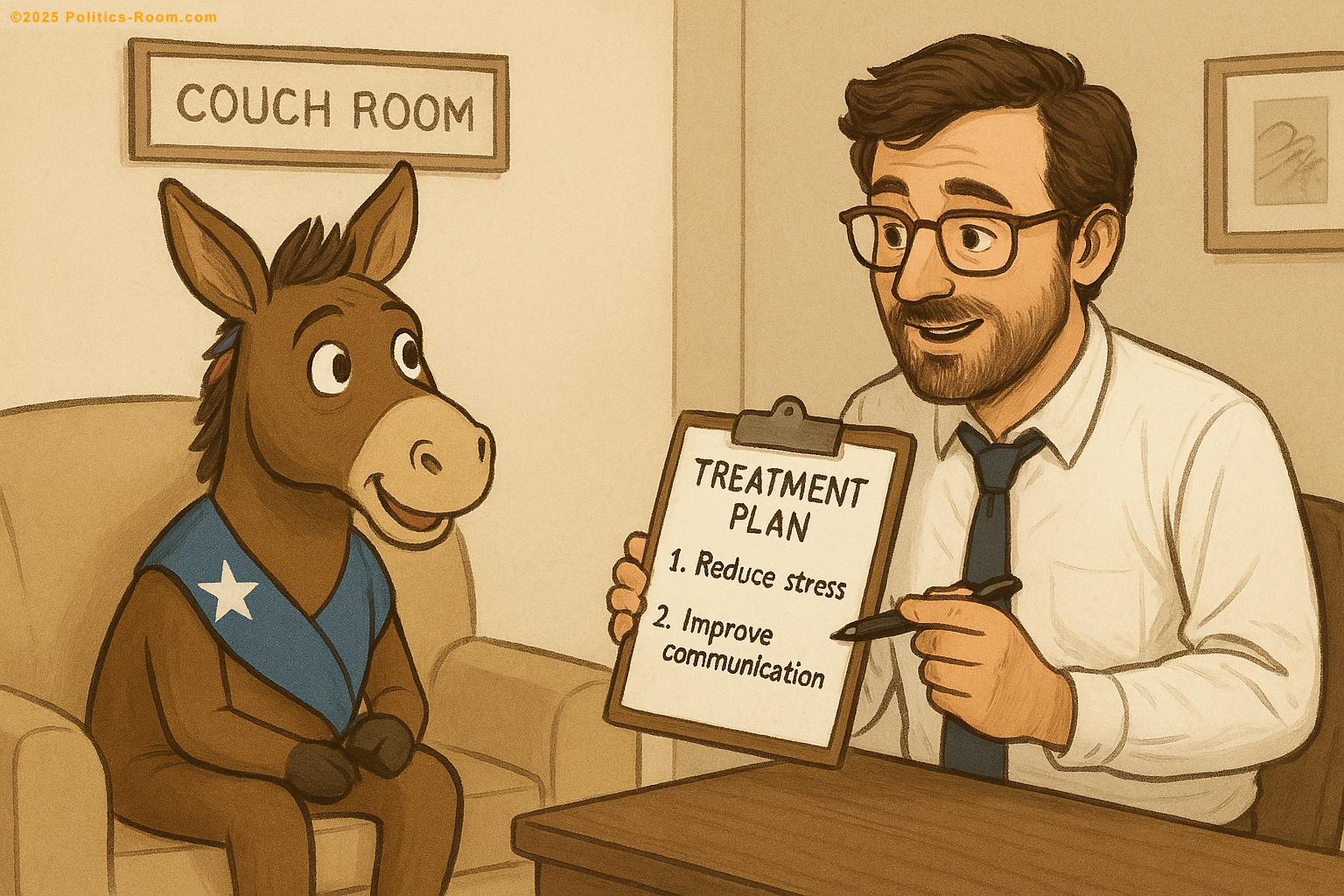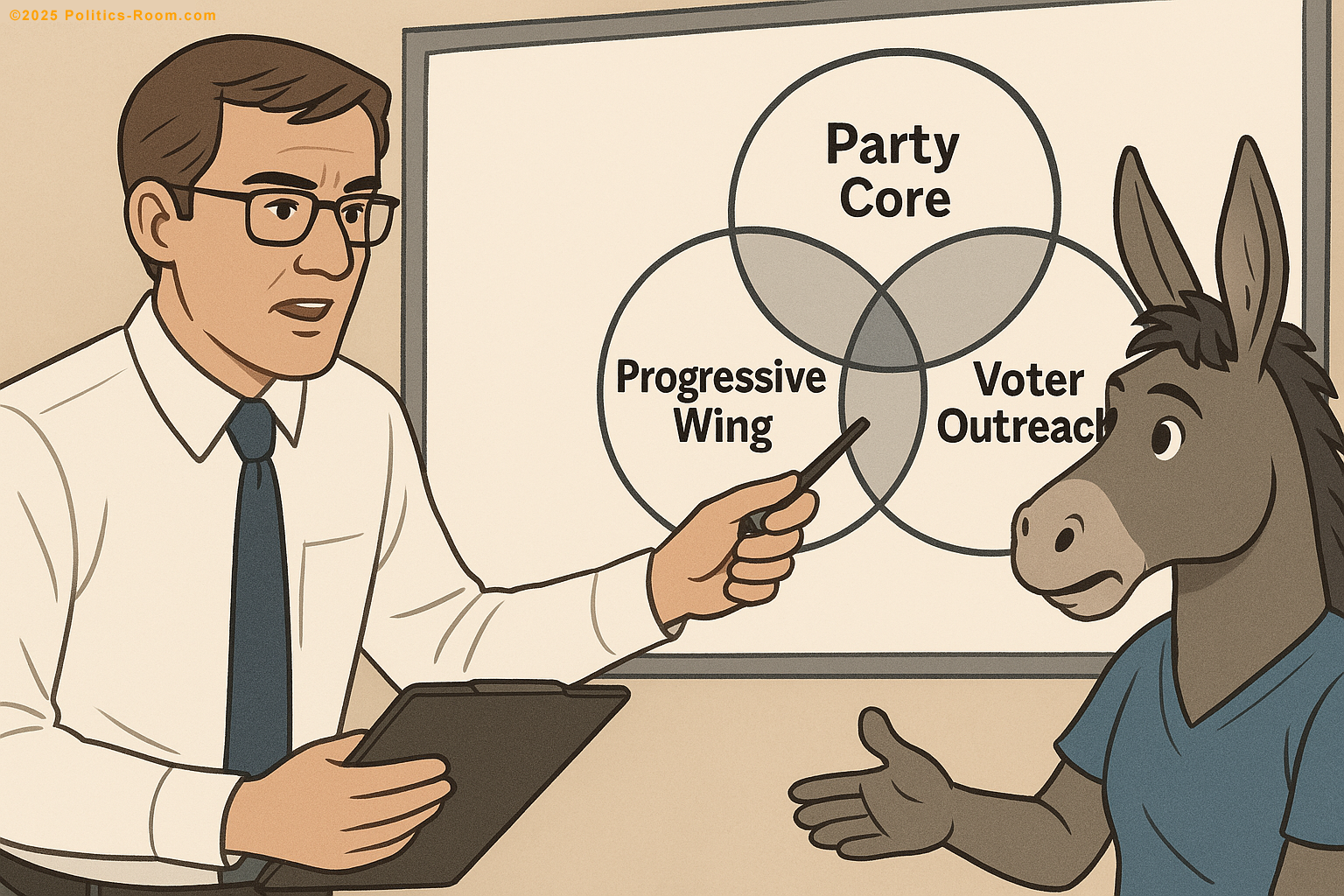🔍 The Diagnostic Session

Dr. Bennett had seen many unusual patients in his years of practice, but nothing quite prepared him for the sight before him. The Democratic Donkey—the actual symbol of the party—lay on his couch, looking exhausted and somewhat singed around the edges. More alarming were the dozens of miniature winged donkeys buzzing around the office, each with tiny cannons mounted on their backs that fired at random intervals.
One miniature donkey with wild white hair and glasses zoomed past, its cannon firing rapidly as it shouted about billionaires. Another with stylish glasses and bold red lipstick circled near the ceiling, its cannon shooting progressive policy proposals in rapid succession. Yet another, wearing a bowtie, fired moderately-toned messages that seemed aimed at suburban voters.
The doctor ducked as a projectile whizzed past his ear.
Dr. Bennett: "Well, this is... quite a situation you've brought into my office."
The Democratic Donkey sighed heavily, wincing as a miniature version with a California accent fired directly at another sporting a West Virginia drawl.
Democratic Donkey: "They used to be so much easier to manage. Now they're everywhere, firing in every direction—sometimes at Republicans, sometimes at each other, occasionally even at me. I can barely keep track of what the party stands for anymore."
A tiny projectile hit the wall beside the doctor, leaving a small blue mark with the words "Medicare For All" emblazoned on it.
Dr. Bennett: "How long has this been going on?"
Democratic Donkey: "It's been getting worse for years, but the 2016 election really accelerated things. Now everyone with a Twitter account—I mean, X account—and a policy position thinks they can redefine what the party stands for. We've always been a big tent, but this..."
A small flock of miniature donkeys flew in formation near the ceiling, their cannons creating a barrage of conflicting messages about border policy.
Democratic Donkey: "I'm exhausted. I don't know who I am anymore."
Dr. Bennett nodded thoughtfully, retrieving his notepad while dodging another airborne message.
Dr. Bennett: "What you're experiencing has a name. In fact, I believe you're suffering from what we might call 'Loose Cannon Syndrome.'"
The Donkey's ears perked up with interest.
Democratic Donkey: "A syndrome? Like a medical condition?"
Dr. Bennett: "In medicine, a syndrome is a set of signs and symptoms that occur together and characterize a particular abnormality. The term comes from the Greek word meaning 'running together.' And that's exactly what's happening with your party—too many symptoms running together in a chaotic pattern."
🔬 The Clinical Definition

Dr. Bennett moved to his whiteboard, narrowly avoiding a collision with a miniature donkey wearing what appeared to be a replica of Nancy Pelosi's famous impeachment suit.
Dr. Bennett: "Let me define 'Loose Cannon Syndrome' in political terms. It's a condition affecting political parties characterized by an overabundance of independent voices, each operating with minimal coordination, creating a messaging environment so diverse and contradictory that the core identity of the party becomes obscured."
He wrote on the board: LOOSE CANNON SYNDROME (LCS)
Dr. Bennett: "Like medical syndromes, LCS has specific symptoms, etiology, and potential treatments. Let's start with the symptoms."
The doctor began listing symptoms on the board:
- 🗣️ Message Proliferation: An excessive number of party-affiliated voices each promoting their own version of what the party stands for.
- 🔄 Circular Firing Squad: Party members attacking each other publicly over ideological differences rather than focusing on opposition.
- 🧠 Identity Confusion: Inability of the general public to clearly articulate what the party's position is on major issues.
- 💰 Resource Diffusion: Fundraising efforts that compete with and sometimes undermine official party fundraising.
- 🏆 Purity Contests: Competition to establish who holds the most authentic or pure version of party values.
- 📣 Volume Over Coherence: Emphasis on being heard over being consistent or strategic.
A miniature donkey with what looked like Bernie Sanders' distinctive hairstyle buzzed the whiteboard, adding its own mark that read "POLITICAL REVOLUTION!" Dr. Bennett calmly erased it and continued.
Democratic Donkey: "That's exactly what's happening! But I always thought our inclusivity was a strength. We pride ourselves on being a diverse coalition. Are you saying that's actually a problem?"
Dr. Bennett: "Diversity of people and perspectives is indeed a strength. But diversity of core messaging without any coherent framework becomes damaging. Think of it like an orchestra—you want many different instruments, but they need to be playing the same piece of music, not each performing a different composition simultaneously."
The Donkey nodded slowly, watching as two miniature versions—one with what appeared to be a Biden-esque aviator sunglasses and another sporting an AOC-style red lip—engaged in what looked like an aerial dogfight over climate policy.
Democratic Donkey: "So what causes this... syndrome?"
🔮 The Etiology

Dr. Bennett turned to a new section of the whiteboard.
Dr. Bennett: "The causes of Loose Cannon Syndrome are multifaceted, but we can identify several key factors:"
- 📱 Social Media Democratization: Platforms that allow any party member to reach large audiences without institutional filters or coordination.
- 💸 Direct Fundraising Technology: Tools like ActBlue that enable individual politicians to build personal donor bases independent of party infrastructure.
- 🌐 Media Fragmentation: The collapse of shared information sources, creating separate information ecosystems even within the same party.
- 🏛️ Institutional Weakness: Decline in the power of traditional party leadership to enforce message discipline or coordinate strategy.
- 🎭 Celebrity Politics: The rise of politician-as-personal-brand, where individual notoriety often outweighs party identity.
- 📊 Algorithmic Amplification: Social media algorithms that reward extreme or divisive content, incentivizing provocative rather than constructive messaging.
Democratic Donkey: "But some of these things have helped us reach new voters! AOC's Instagram presence brings in young people. Bernie's email list reaches millions. Our fundraising has been through the roof with these new tools."
Dr. Bennett nodded, ducking as a miniature donkey labeled "Squad" flew past, its cannon firing rapidly.
Dr. Bennett: "That's what makes this syndrome so challenging—many of its causes are double-edged swords. They provide benefits while simultaneously creating problems. It's similar to how some medical treatments have both therapeutic effects and side effects."
Democratic Donkey: (watching as multiple miniature donkeys fired simultaneously at what appeared to be a cardboard cutout of Mitch McConnell) "Not all the firing is friendly fire, I should point out. Sometimes they coordinate."
Dr. Bennett: "True. The question is whether the coordination is strategic or merely coincidental. In Loose Cannon Syndrome, even when multiple voices align on a target, they often use contradictory rationales or propose conflicting solutions."
The Donkey's ears drooped slightly.
Democratic Donkey: "OK, I think I understand the problem. But isn't this just politics in the digital age? Can it even be treated?"
💊 The Treatment Plan

Dr. Bennett smiled reassuringly, setting down his marker and returning to his chair.
Dr. Bennett: "Every syndrome has potential treatments, even if there's no complete cure. Let me outline some therapeutic approaches for Loose Cannon Syndrome."
He flipped to a new page in his notepad.
- 🎯 Core Message Framework: Develop a concise set of principles that all party members can reference, regardless of their specific policy positions. This creates coherence without requiring uniformity.
- 🤝 Strategic Collaboration Platforms: Establish regular communication channels between various party voices to coordinate timing and prevent message collisions.
- 🧩 Role Clarification: Define distinct roles for different voices—some speak to the base, others to swing voters; some focus on vision, others on policy details.
- 📊 Message Testing & Feedback: Create rapid response capabilities to identify which messengers and framings are most effective for specific audiences.
- 🔄 Productive Disagreement Protocols: Establish norms for how internal disagreements are expressed publicly to prevent damaging the broader party brand.
- 🧠 Strategic Silence Training: Teach party members when NOT to speak—sometimes the best contribution is withholding commentary that might complicate an existing narrative.
A miniature donkey with what looked like Elizabeth Warren's hairstyle hovered near the doctor's notepad, seemingly taking notes of its own.
Democratic Donkey: "So you're not suggesting we silence anyone completely? Just... organize the cacophony better?"
Dr. Bennett: "Exactly. It's about creating harmony rather than enforcing uniformity. The difference between a symphony and noise isn't the number of instruments—it's coordination."
The Donkey considered this, then asked a question with surprising vulnerability.
Democratic Donkey: "But how do we handle the truly independent voices? The Bernies and AOCs who technically aren't even Democrats but use our infrastructure while criticizing us? They're both assets and... well, pains in my rear end, to be honest."
Dr. Bennett chuckled at the candor.
Dr. Bennett: "That's a particularly challenging aspect of your syndrome. You might call it the 'Independent Affiliate Paradox'—figures who simultaneously benefit from party association while maintaining independence from party discipline."
Democratic Donkey: (sighing) "Bernie runs in our primaries but won't join the party. AOC joined but often acts like she's leading an insurgency from within. They bring energy and voters we need, but sometimes it feels like having roommates who criticize your furniture while refusing to help pay the rent."
🧠 The Independent Affiliate Protocol

Dr. Bennett nodded thoughtfully, returning to the whiteboard to sketch a diagram showing overlapping circles labeled "Party Core," "Progressive Wing," "Independent Affiliates," and "Voter Outreach."
Dr. Bennett: "For these 'Independent Affiliates,' I'd recommend a specific protocol within your broader treatment plan. It acknowledges their unique status while establishing clearer boundaries."
He began listing points:
- 📜 Explicit Agreements: Formalize the relationship between the party and independent-minded figures, clearly stating mutual expectations and benefits.
- 🥅 Shared Outcome Focus: Maintain unity around common electoral goals even when disagreeing on policy details or messaging tactics.
- 🔄 Value Exchange Recognition: Openly acknowledge what each brings to the relationship—the party provides infrastructure, the independents bring energy and new voters.
- 🧩 Complementary Targeting: Coordinate outreach so independent voices focus on demographics the mainstream party struggles to reach.
- 🚫 Red Line Consensus: Establish the few absolute boundaries that cannot be crossed without consequences (like directly attacking the party nominee during a general election).
Democratic Donkey: (with skepticism) "You really think Bernie or AOC would agree to something like this? Their whole brand is being outsiders who speak truth to power."
Dr. Bennett: "The key is framing it as mutual empowerment rather than constraint. In psychological terms, you're establishing a 'secure attachment' rather than a controlling relationship. They maintain independence while gaining the benefits of affiliation."
A miniature donkey that looked remarkably like Chuck Schumer flew past, its cannon temporarily jammed. It seemed to be frantically working to fix the mechanism.
Democratic Donkey: (with sudden amusement) "So you're suggesting we need couple's therapy with our progressive wing?"
Dr. Bennett: (laughing) "In a sense, yes! That's a surprisingly apt metaphor. Like any relationship, it requires communication, boundaries, and mutual respect to function well."
The Donkey's expression became more thoughtful.
Democratic Donkey: "You know, we Democrats spend so much time focusing on policy that we sometimes forget politics is ultimately about relationships—between leaders, between factions, between the party and voters."
Dr. Bennett: "Exactly. And like all relationships, they require maintenance and occasional intervention when patterns become dysfunctional."
📊 The Practical Implementation

The Democratic Donkey shifted on the couch, watching as some of the miniature winged donkeys seemed to be spontaneously organizing into more coherent flight patterns. A few had even coordinated their cannon fire to create a message about climate action that actually made sense.
Democratic Donkey: "This all sounds good in theory, but how do we actually implement it? We're not exactly known for our organizational discipline."
Dr. Bennett pointed to the miniature donkeys that were beginning to coordinate.
Dr. Bennett: "Start small and build. Here are some concrete steps:"
- 📱 Message Coordination Platform: Create a digital hub where key party communicators can see what others are planning to announce, allowing for deconfliction and amplification.
- 📊 Real-time Feedback Dashboard: Develop a system that tracks how various messages are performing with different voter segments, creating a shared reality about what's working.
- 🎓 Strategic Communications Training: Offer workshops for candidates and officials on how to advance personal priorities while strengthening rather than undermining party cohesion.
- 🔍 Position Clarification Process: Establish a method for quickly determining and disseminating the official party position on emerging issues before mixed messaging can take hold.
- 🎯 Target Assignment System: Coordinate which messengers focus on which opponents to prevent scattered, ineffective criticism.
Democratic Donkey: (intrigued) "We kind of tried something like that 'Position Clarification Process' during the last administration. We called it message discipline, but it fell apart as soon as Twitter—X, whatever—lit up with hot takes."
Dr. Bennett: "That's why this needs to be a comprehensive approach. A single tactic won't work. You need the full treatment protocol."
The Donkey watched as more miniature donkeys began to coordinate, though several—notably those resembling certain prominent progressives and moderates—continued to fly their own patterns.
Democratic Donkey: "What about the voters? Don't they get confused by all this mixed messaging too?"
Dr. Bennett: "That's the most damaging symptom of Loose Cannon Syndrome—voter confusion. When people can't easily articulate what your party stands for, you've got a serious problem."
🗳️ The Voter Connection

Dr. Bennett retrieved a folder from his desk and opened it to reveal polling data.
Dr. Bennett: "Research shows that voters across the spectrum—even your own base—often struggle to identify what Democrats consistently stand for. They can name specific policies but not core values. Meanwhile, Republicans benefit from message simplicity, even when it oversimplifies complex issues."
Democratic Donkey: (defensively) "But we're the party of nuance and complexity! The world IS complicated!"
Dr. Bennett: "Complexity is reality, but effective communication requires clarity. You don't need to oversimplify your policies, but you do need to articulate your values simply and consistently."
He drew a simple diagram on the whiteboard showing a pyramid with "Core Values" at the base, "Policy Frameworks" in the middle, and "Specific Proposals" at the top.
Dr. Bennett: "This is what voters need to understand about your party. The specific proposals can vary by region, candidate, or circumstance. The policy frameworks can evolve over time. But the core values should be instantly recognizable across all your communications."
Democratic Donkey: "Like 'freedom' for Republicans?"
Dr. Bennett: "Exactly. When a voter hears a Republican speak—regardless of whether it's a moderate or a hardliner—they hear 'freedom' as an organizing principle. What do voters consistently hear from Democrats?"
The Donkey thought for a moment.
Democratic Donkey: "Equality? Justice? Opportunity? Community? We have several."
Dr. Bennett: "And therein lies part of the problem. Even you, the embodiment of the party, list multiple core values without a clear hierarchy. Now multiply that by hundreds of elected officials and thousands of candidates, each emphasizing different values or using different language for the same values."
The Donkey watched as the miniature flying donkeys, now considerably more organized, began to form a pattern that spelled out "OPPORTUNITY FOR ALL" in the air above them.
Democratic Donkey: (with dawning realization) "So treatment for Loose Cannon Syndrome isn't just about coordination—it's about clarity and consistency in what we're coordinating around."
Dr. Bennett: "Precisely. The most effective treatment combines both internal process improvements AND message clarification."
🌟 The Prognosis

As their session neared its conclusion, Dr. Bennett observed the remarkable transformation taking place. Most of the miniature donkeys were now flying in coordinated formations, their cannon fire synchronized to create coherent messages rather than chaotic crossfire. A few independent operators remained—the Bernie and AOC lookalikes in particular—but even they seemed to be flying patterns that complemented rather than contradicted the main groups.
Dr. Bennett: "I'm seeing significant improvement already. What's changed?"
The Democratic Donkey stood up from the couch, looking more energized and focused.
Democratic Donkey: "Just having a framework to understand the problem helps. I've been trying to control every message, every messenger—which is impossible. Instead, I need to establish the core principles and coordination mechanisms, then let the natural diversity of voices work within that structure."
Dr. Bennett nodded approvingly.
Dr. Bennett: "That's an excellent insight. So what's your prognosis? Can the Democratic Party recover from Loose Cannon Syndrome?"
Democratic Donkey: (with newfound confidence) "I believe we can. We have three key advantages: First, our diversity of voices is actually a strength when properly coordinated. Second, many of our loose cannons are firing with good intentions—they want to help, even when they're creating problems. And third, we've survived internal discord before."
The Donkey gestured to the miniature flying messengers, now forming a synchronized display of democratic values and policy proposals.
Democratic Donkey: "We don't need fewer voices—we need better harmony. Less cacophony, more chorus."
Dr. Bennett: "That's a wise approach. And what specific steps will you take first?"
Democratic Donkey: "I think we start with that core values framework—defining the 3-5 fundamental principles that unite all Democrats, from moderates to progressives. Then we create simple coordination mechanisms, starting with our leadership and extending to key communicators. Nothing heavy-handed—just enough structure to prevent friendly fire."
A miniature donkey that looked remarkably like Pete Buttigieg flew by, its cannon now firing precise, well-articulated messages about infrastructure that somehow made municipal bonds sound exciting.
Democratic Donkey: (with a chuckle) "And maybe we need to acknowledge that some of our cannons aren't actually loose—they're just firing in a different direction than we expected. The solution isn't always to redirect them but sometimes to adapt our strategy to incorporate their target."
Dr. Bennett: "Now you're thinking like a therapist rather than a controller. Psychological health isn't about eliminating all symptoms—it's about integrating diverse aspects of personality into a functioning whole."
As they concluded the session, the Democratic Donkey headed for the door with a noticeably lighter step. The miniature flying donkeys, now operating with remarkable coordination, formed an honor guard around their full-sized counterpart.
Democratic Donkey: (pausing at the door) "You know, Doctor, I've been around since Andrew Jackson's day. I've survived civil wars, world wars, cold wars, and culture wars. Loose Cannon Syndrome is just another challenge to overcome."
Dr. Bennett: "With that perspective, I think your prognosis is excellent. See you next week?"
Democratic Donkey: "Absolutely. Though fair warning—I might bring the Republican Elephant. They've got a different syndrome entirely."
Dr. Bennett: (with a knowing smile) "Ah yes, Blind Loyalty Syndrome. That's a whole other session."
As the door closed behind his unusual patient, Dr. Bennett couldn't help but reflect on how political parties weren't so different from the individuals he typically treated. Both needed to integrate diverse aspects of themselves, maintain coherent identity amid change, and balance independence with connection. In an age of fragmentation and polarization, perhaps what both parties needed most was not another strategy memo, but a good therapist.